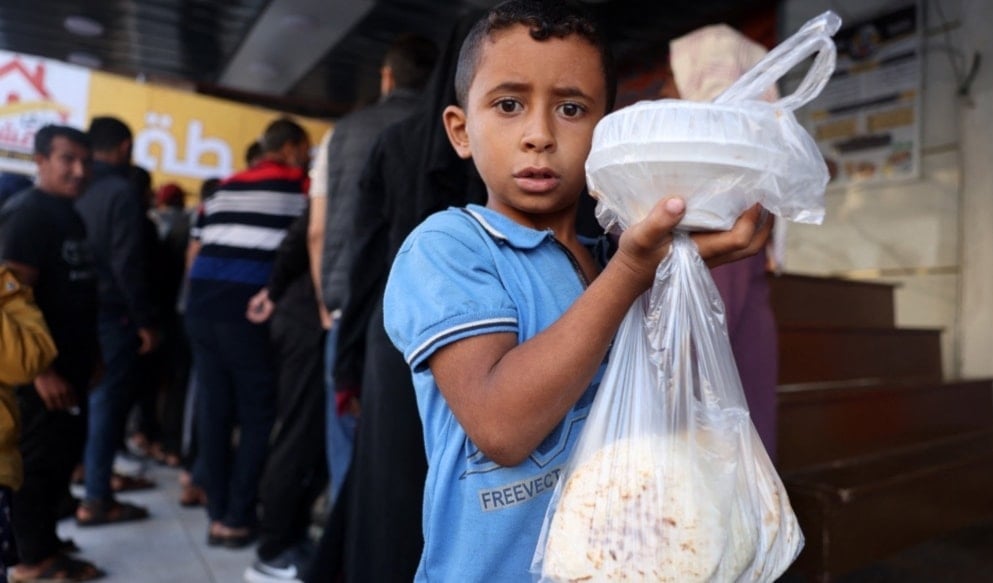Food, water in Gaza 'practically non-existent': UN WFP
The executive director of the WFP, Cindy McCain warns that the people of Gaza are facing starvation, as the amount of food coming into Gaza is “woefully inadequate”.
-

A boy returns home with bags of food for his family in Rafah in the southern Gaza Strip on October 20, 2023. (AFP)
In a statement on Thursday, the executive director of the WFP, Cindy McCain warned that the people of Gaza are face to face with starvation as water and food are “practically non-existent”.
“With winter fast approaching, unsafe and overcrowded shelters, and the lack of clean water, civilians are facing the immediate possibility of starvation,” she said, adding that the amount of food coming into Gaza is “woefully inadequate” like bread which is now “scarce or non-existent”.
She further stressed the impossibility of being able to “meet current hunger needs with one operational border crossing”.
WFP spokesperson for the Middle East and North Africa, Abeer Etefa, highlighted at a virtual UN news conference that this is evident already, as there are “cases of dehydration and malnutrition, which is increasing rapidly and by the day”, adding: “With only 10 percent of necessity food supplies and drink in Gaza since the beginning of this conflict, we’re now facing a massive food gap”.
Read next: OCHA calls for opening of 'Kerem Shalom' border to deliver aid to Gaza
Upon declaring that 2.2 million Palestinians, which is the entire population of Gaza now are in dire need of food, Etefa urged to increase the number of trucks of food aid since the collapse of the food supply chain is “catastrophic,” and now “disastrous.”
Insufficient amounts to inevitable deaths
Simultaneously, the Commissioner-General of the UN Relief and Works Agency for Palestine Refugees (UNRWA), Philippe Lazzarini, relayed his belief in an intentional attempt to “strangle” its humanitarian work in Gaza.
Talking to reporters in Geneva on Thursday, he said, “I do believe there is a deliberate attempt to strangle our operation and paralyze the operation,” adding: “We run the risk to have to suspend the entire humanitarian operation”.
He expressed how “outrageous” it is “that humanitarian agencies have been reduced to begging for fuel.”
According to Lazzarini, the first fuel delivery since October took place this week, but the 24,000 liters of diesel fuel for UN aid distribution trucks is insufficient for what Gaza needs to survive.
“Today what we are saying is if the fuel does not come in, people will start to die because of the lack of fuel. Exactly as from when, I don’t know. But it will be sooner rather than later,” he said.
Read more: Resistance calls on free people of the world to protest for Palestine
Speaking on the communication cut-off in Gaza, Lazzarini said, “It can provoke or accelerate [the breakdown of] last remaining civil order we have in the Gaza Strip,” describing the destruction in Gaza “just staggering.”
The failure of the international community
Addressing journalists in occupied al-Quds, Lazzarini voiced his disapproval last month of the international community's apparent abandonment of Gaza.
The international community “seems to have turned its back on Gaza," he said.
"People in Gaza are dying; they are not only dying from bombs and strikes: soon many more will die from the consequences of (the) siege imposed on the Gaza Strip," he said.
Lazzarini further mentioned that there is a severe shortage of fuel in Gaza, with a daily requirement of approximately 160,000 liters (or 42,200 gallons) to support hospitals and bakeries.

 3 Min Read
3 Min Read








